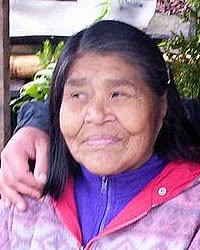Kaweshkar (men of skin and bones), also known as Alacalufe, are indigenous people living in Chilean Patagonia, specifically in the Gulf of Peñas, Tierra del Fuego, and near the Strait of Magellan. Their traditional language is known as Kawésqar; and it is in danger of extinction, as few native speakers survive.
Kawésqar is defined as those who still practiced their native culture or spoke their native language. In 2006, only 15 full-blooded members remained, but numerous mestizos have Kawésqar ancestry. Lessons in the Kawésqar language are part of the local curriculum, but few native speakers remain to encourage daily use of their traditional language.
In 1840 Thomas Bridges, an Anglican missionary based in Ushuaia who had been proselytizing and studying the Indigenous peoples of Tierra del Fuego since the late 1860s, and his son Despard compiled a 1,200-word vocabulary for the Kawésqar language in the form of a manuscript. Through the late 19th and early 20th centuries, numerous missionaries and anthropologists moved among the indigenous peoples to record, study, and, in the case of the missionaries, share the gospel with them.
In 1881, European anthropologists took eleven Kawésqar people from Patagonia to be exhibited in the Bois de Boulogne in Paris, and in the Berlin Zoological Garden. Only four survived to return to Chile. Early in 2010, the remains of five of the seven who died in Europe were repatriated from the University of Zurich, Switzerland, where they had been held for studies. Upon the return of the remains, Chilean President Michelle Bachelet formally apologized for the state having allowed these Indigenous people to leave the country to be exhibited and treated like animals.
The Kaweshkar were always on top of their hallef (canoe), traveling to places where there was an abundance of seafood or where they could hunt sea lions or huemules. The camps they set up in sheltered places along the coast were precarious, consisting of huts made of a framework of branches covered with wolf hide. In such a difficult geographical environment, with heavy and constant rains, low temperatures, and treacherous water channels, the social structure was very precarious. Grouped in small bands, they would only meet on the occasion of a beached whale or exceptionally abundant game. Animal blubber was a fundamental part of their diet, which was complemented by the consumption of shellfish gathered by the women.
The core of Kawésqar society was the family. There was also a chief, who was in charge of the hunting expeditions.
When the man married, he made his first canoe, acquired his first dogs, and built his first house, as a symbol of independence. Marriage was forbidden between brother and sister and between cousins, both maternal and paternal.
Today, the Kawésqar lived from the sale of handicrafts, fishing, and shellfish gathering, and state benefits. Chile's Indigenous Peoples Law recognizes the Kawésqar ethnicity among several groups whose cultural heritage and rights must be preserved and protected.
The Kawéskar believed in a supreme being called Xolas, a religious belief similar to those of their Selk'nam, Yámanas and Aónikenk neighbors. They practiced shamanism, as well as puberty initiation ceremonies (kálava) and secret male ceremonies (yinchihawa). However, when the French ethnologist Joseph Emperaire visited them between 1946 and 1948, the Kawéskar religious imaginary was dominated by Ayayema, the evil spirit of the swamps that controlled the storms and took men to his kingdom of death and decay.
The Kaweshkar people need their environment to continue to be preserved and bilingual education (Spanish-Kaweshkar) to continue to be offered so that their culture does not disappear.
It would be desirable for the seed of the gospel that was sown in the ancestors of those who inhabit today, to bloom and expand throughout the region.
Pray that the seed of the gospel that was once sown among these people may grow.
Pray that Christians in Chile will feel the need to preach to the indigenous groups such as the Kaweshkars.
Pray that the Lord open the eyes of mission organizations to the indigenous people in Latin America.
Scripture Prayers for the Kawashkar in Chile.
https://www.memoriachilena.gob.cl/602/w3-article-93784.html
https://etniasdelmundo.com/c-chile/kawesqar/
https://revistachilena.com/Kaweshkar_o_Alacalufes.html
https://en.wikipedia.org/wiki/Kawésqar
| Profile Source: Joshua Project |










